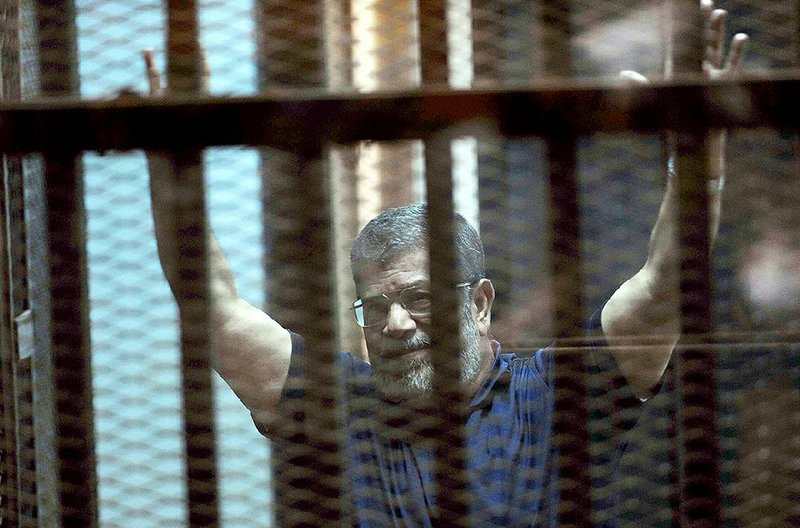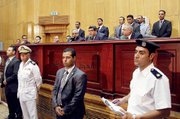CAIRO -- An Egyptian court Saturday sentenced the country's first freely elected leader, ousted Islamist President Mohammed Morsi, to death over a mass prison break during the 2011 uprising that eventually took him to power.
The ruling applies to another 105 people and is the latest in a series of mass death sentences handed down since the military overthrew Morsi nearly two years ago.
Hours after the verdict was issued, three Egyptian judges were killed by gunmen while riding a bus in the Sinai Peninsula. Egypt has been shaken by an upsurge in attacks by insurgents in Sinai since Morsi was deposed by the military in 2013. It was not immediately clear whether Saturday's attack was connected to the verdict against Morsi.
Egypt's judiciary has come under mounting international criticism since Morsi's ouster as it has handed down harsh mass sentences to Islamists and jailed secular activists for protesting. At the same time, the courts have acquitted or handed light sentences to top officials who served under President Hosni Mubarak, whose nearly 30-year reign was ended by the 2011 Arab Spring-inspired uprising.
"These sentences are yet another manifestation of the deeply troubling way the Egyptian judiciary has been used as a tool to settle political disagreements," Emad Shahin, a professor at the American University in Cairo who was sentenced to death in absentia, wrote in a Facebook post.
"Due process, regard for evidence, and minimum standards of justice have been tossed aside in favor of draconian injustice," wrote Shahin, now a visiting professor at the School of Foreign Service at Georgetown University in Washington, D.C.
As is customary in capital-punishment cases, Judge Shaaban el-Shami referred his death sentences on Morsi and the others to the nation's top Sunni Muslim religious authority, the grand mufti, for his nonbinding opinion. El-Shami set June 2 for the next hearing, and the sentences can be appealed.
Morsi already is serving a 20-year sentence for his part in the 2012 deaths of protesters outside a Cairo presidential palace.
The military overthrew Morsi in July 2013 after days of mass protests by Egyptians angered by policies perceived as divisive. Egyptian President Abdel-Fattah el-Sissi, who had been appointed military chief by Morsi, led his ouster, and was elected nearly a year ago in a vote boycotted by the Islamist opposition.
Since his ouster, authorities have cracked down on Islamists and pro-democracy activists who were instrumental in the 2011 uprising. Thousands of Morsi supporters have been jailed and hundreds killed in street clashes over the past two years, including at least 600 in one day, when security forces violently dispersed two pro-Morsi sit-ins in August 2013.
After the verdict was read Saturday, a smiling Morsi, wearing a blue prison uniform and standing inside a metal and glass cage built in the courtroom, defiantly waved the four-finger sign associated with the sit-ins.
In a separate case, the judge also sentenced 16 people to death in an espionage case in which Morsi and other Muslim Brotherhood leaders were accused of conspiring with foreign armed groups, including Hamas and Hezbollah, to destabilize Egypt. Morsi was not among those condemned to death in that case.
A verdict on Morsi's role will be announced in the June 2 hearing.
As the government has cracked down on Islamists and other activists, the courts have been far more lenient to Mubarak-era officials. Mubarak himself was acquitted in November of charges linked to the killings of hundreds of protesters in 2011 and has not spent a single day in prison since his arrest in April 2011.
The 87-year-old Mubarak was sentenced May 9 to three years for corruption but was later declared a free man since he had already spent three years in detention, mostly at a military hospital in a southern Cairo suburb. Prosecutors have appealed his acquittal over the deaths of protesters, and a high court will decide next month whether he should be retried.
Sentenced to death with Morsi on Saturday were 105 defendants, including some 70 Palestinians. The defendants include the Muslim Brotherhood's spiritual leader, Mohammed Badie -- who has already been sentenced to death in a separate trial -- as well as one of the Arab world's best-known Islamic scholars, the Qatar-based Youssef al-Qaradawi. Most defendants were tried and convicted in absentia, meaning they will receive automatic retrials if they are detained.
Supporters of Morsi and his Muslim Brotherhood, which is now outlawed and branded a terrorist group, chanted "down, down with military rule" as the judge announced the verdict in a converted lecture hall in the national police academy.
Prosecutors alleged that armed members of the Palestinian Hamas group entered Egypt during the 18-day uprising in 2011 through illegal tunnels running under the Gaza-Sinai border. Taking advantage of the turmoil, the militants fought their way into several prisons, releasing Morsi, more than 30 other Muslim Brotherhood leaders and some 20,000 inmates, prosecutors say. Several prison guards were killed and parts of the stormed prisons were damaged.
After leaving the prison, Morsi announced his escape in a call from a satellite phone to the news channel Al-Jazeera. Neither before nor during his tenure as president did he face charges over the episode.
Hezbollah and Hamas operatives who had been convicted and sentenced to jail terms over terror-related charges were also sprung out of jail in 2011.
In Gaza, Hamas spokesman Sami Abu Zuhri said the sentencing to death of the Palestinians was "regrettable" and "shocking," adding that "some of those convicted were killed before the Egyptian revolution and others are serving prison terms in Israel." He said nothing about Morsi's death sentence.
Hamas is the Palestinian chapter of the Muslim Brotherhood and enjoyed close relations with Morsi during his year in office, but has denied taking part in the prison breaks.
Amr Darrag, a Cabinet minister under Morsi and a co-founder of the Brotherhood's Freedom and Justice Party, also blasted Saturday's verdicts.
"Today will be remembered as one of the darkest days in Egypt's history" and as a symbol "of the dark shadow of authoritarianism that is now cast back over Egypt," he said.
An Islamist opposition alliance led by the Brotherhood meanwhile called on Egyptians to step up the campaign to topple the "gang of treachery and usurpers" in the run-up to July 3, the second anniversary of Morsi's removal from power.
Amnesty International also denounced the verdicts, saying "the death penalty has become the favorite tool for the Egyptian authorities to purge the political opposition."
Turkish President Recep Tayyip Erdogan said el-Sissi's government was returning to the "old Egypt" by rolling back democracy. He also criticized the West, saying it had failed to speak out against such death sentences.
Mona El-Ghobashy, a visiting scholar at the Institute for Religion, Culture and Public Life at Columbia University, said Morsi's trial was part of the Egyptian authorities' offensive against the forces of the uprising that toppled Mubarak.
"The self-appointed permanent guardians of the state, judiciary and military, are messaging that the revolution's political results (free elections, civilian president, right to protest) were unnatural, unreal and unsustainable," El-Ghobashy wrote in an email. "They're saying to Egyptians: This whole business of democracy and choosing your rulers is a fantasy. That's not the way power works here.
"In light of the politically charged environment within which the Morsi prosecutions are taking place, the perception by some may be that these trials are more about political retaliation than bona fide criminal activity," she said.
Information for this article was contributed by Hamza Hendawi of The Associated Press and by Jared Malsin of The New York Times.
A Section on 05/17/2015

